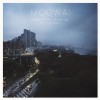
Every time Mogwai release a new album, there is a line of thought that repeats itself among fans yearning for the band's past glories: "Hmm... another reliably average and/or boring Mogwai album... it's no Young Team." Well, I suggest we consider that streak broken—because, 15 years and seven studio albums into their career, Mogwai have recorded and released their very best work...
 
... and buried it on the bonus CD included with the deluxe version of Hardcore Will Never Die, but You Will—another reliably average and/or boring Mogwai album.
First things first: I am blown away each time I listen to "Music for a Forgotten Future (The Singing Mountain)," a long-form composition created to soundtrack an art installation by Douglas Gordon and Olof Nicolai. This restrained, elegant and evocative mini-masterpiece is, frankly, Mogwai's best recorded work. Featuring a three-piece string section (violin, viola, cello) along with piano, gentle chimes, and background tape hiss, "Music for a Forgotten Future" unfolds patiently for 15 minutes, an elegiac music-box lullaby with ominous undertones. Guitars eventually join, building to a brief and well-earned crescendo, followed by a beautiful coda on strings alone. Length aside, this is a much different beast than "Mogwai Fear Satan" or "My Father My King"—trading in muscle for minutiae, "Music for a Forgotten Future" is the work of a veteran band playing to strengths that barely existed in its work until now. This is essential listening—the sample below doesn't begin to do it justice.
Unfortunately, nothing on the proper, patchy album holds a candle to "Music for a Forgotten Future." Mogwai are at their most tedious as a full-on rock band—their tempos drag, sacrificed for the sake of heaviness, and all sense of forward motion in their music disappears. The first song Sub Pop released from Hardcore Will Never Die left me indifferent: "Rano Pano" finds Mogwai straining to capture the sense of churning, psychedelic heaviness perfected by past tourmates Bardo Pond, but coming up empty-handed. The riff at the song's core sounds fine for a few bars, but fails to evolve like Bardo's druggy, kaleidoscopic psych-rock, becoming a chore to endure for five minutes.
To be fair, "Rano Pano" is a contender for the worst song on Hardcore Will Never Die, which is, overall, a notable improvement on Mogwai's dreadful last album, The Hawk Is Howling. One quick-fix addition is the motorik beat that anchors several of these song, allowing the songs to breathe instead of plod. Granted, Mogwai's version of motorik at times sounds studied, unnatural, like it was Xeroxed straight from a Krautrock 101 handbook. Songs like "Mexican Grand Prix," while a breath of fresh air on Hardcore Will Never Die, also make me want to pull out my Neu! and La Düsseldorf records to experience Klaus Dinger's brilliance firsthand—not a tribute to the source material. There are also songs like "San Pedro," which apply the motorik drum pattern in a more forceful, rock-based setting that I find somewhat engaging, but not a strong case for the album overall.
The best song on Hardcore Will Never Die, but You Will doesn't draw from Krautrock, though, and isn't rock-based at all. If anything, I would consider "Letters to the Metro" the baby brother of "Music for a Forgotten Future," a successful translation of that piece's atmospheric beauty into a snapshot one-fifth its length. A simple piano melody anchors "Letters to the Metro," accompanied by strings and an achingly pretty slide guitar in the chorus—subtle, effective embellishment. The enjoyable moments on Hardcore Will Never Die are a reminder that Mogwai's best days are not behind them, but that their key to success is no longer rooted in soft-loud gimmicks and overcooked riffs, but the gorgeous, infinitely compelling ambience of "Music for a Forgotten Future" and its kin.
Samples:
Read More

